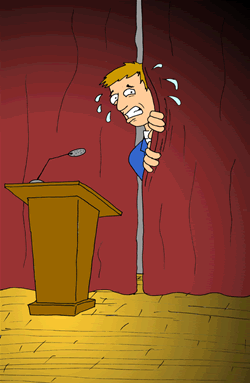Glossophobia
Glossophobia (or Stage fright or performance anxiety) is the anxiety, fear, or persistent phobia which may be aroused in an individual by the requirement to perform in front of an audience, whether actually or potentially (for example, when performing before a camera). In the context of public speaking, this fear is termed glossophobia, one of the most common of phobias. Such anxiety may precede or accompany participation in any activity involving public self-presentation. In some cases stage fright may be a part of a larger pattern of social phobia or social anxiety disorder, but many people experience stage fright without any wider problems. Quite often, stage fright arises in a mere anticipation of a performance, often a long time ahead. It has numerous manifestations: fluttering or pounding heart, tremor in the hands and legs, sweaty hands, diarrhea, facial nerve tics, dry mouth, erectile dysfunction. Stage fright is most commonly seen in school situations, like stand up projects and class speeches.
Effects of stage fright
When someone starts to feel the sensation of being scared or nervous they start to experience anxiety. According to a Harvard Mental Health Letter, "Anxiety usually has physical symptoms that may include a racing heart, a dry mouth, a shaky voice, blushing, trembling, sweating, and nausea" (Beyond Shyness). It triggers the body to activate its sympathetic nervous system. This process takes place when the body releases adrenaline into the blood stream causing a chain of reactions to occur. This bodily response is known as the "fight or flight" syndrome, a naturally occurring process in the body done to protect itself from harm. “...The neck muscles contract, bringing the head down and shoulders up, while the back muscles draw the spine into a concave curve. This, in turn, pushes the pelvis forward and pulls the genitals up, slumping the body into a classic fetal position" (Cyphert).
In trying to resist this position, the body will begin to shake in places such as the legs and hands. Several other things happen besides this. Muscles in the body contract causing them to be tense and ready to attack. Second, "blood vessels in the extremities constrict" (Cyphert). This can leave a person with the feeling of cold fingers, toes, nose, and ears. Constricted blood vessels also give the body extra blood flow to the vital organs.
In addition, those experiencing stage fright will have an increase in blood pressure, which supplies the body with more nutrients and oxygen in response to the "fight or flight" instincts. This, in return, causes the body to overheat and sweat. Breathing will increase so that the body can obtain the desired amount of oxygen for the muscles and organs. Pupils will dilate giving someone the inability to view any notes they have in close proximity, however, long-range vision is improved making the speaker more aware of their audience's facial expressions and non verbal cues in response to the speaker's performance. Lastly, the digestive system shuts down to prepare for producing energy for an immediate emergency response. This can leave the body with the effects of dry mouth, nausea, or butterflies (Cyphert).
Chat rooms • What links here • Copyright info • Contact information • Category:Root
